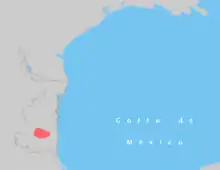Maratino language
Maratino is a poorly attested extinct language that was spoken in north-east Mexico, near Martín, Tamaulipas. Swanton, who called it 'Tamaulipeco', classified it as Uto-Aztecan based on a few obvious cognates, such as Maratino chiguat 'woman' ~ Nahuatl cihuātl 'woman' and peyot 'peyote' ~ Nahuatl peyotl, but other scholars have not considered this to be enough to classify the language.
| Maratino | |
|---|---|
| Tamaulipeco | |
| Region | near Martín, Tamaulipas, NE Mexico |
| Extinct | (date missing) |
unclassified | |
| Language codes | |
| ISO 639-3 | None (mis) |
| Glottolog | mara1266 |
 The location of Maratino in Tamaulipas state | |
Vocabulary
The following vocabulary list of Maratino is from John Swanton (1940: 122–124).[1]
gloss Maratino able kugtima after the manner of niwa although kuaahne and he arrow ciri bird magtc bow mahkā but yet kuaahne children tzikuini come home, to utepa cord pong cry, to mimigihi deer kons(gio) (diminutive suffix) -i drink, to baah(ka) eat, to migtikui enemy koapagtzi escape, to kugtima far kuiüsikuima flee, to pamini forces koh forest (?) tamu go, to nohgima joy maamehe kill, to paahtcu leap, to maatzimetzu like niwa lion xuri little -i many a-a meat migtikui mountain tamu not -he now mohka our ming peyote peyot (plural suffix) -a run, to kuino, kugtima see, to tepeh shots katama shout, to nohgima shout for joy, to maamehe sleep, to tutcē strength koh the tze them me these tze to tamu unable kugtimā us ko, ming very kuiüsikuima war, to tamu we ming weep, to mimigihi without -he wolf bum woman tciwat woods tamu yet kuaahne
References
- Swanton, John. 1940. Linguistic material from the tribes of southern Texas and northern Mexico. (122–124)
Further reading
- Swanton, John. 1940. Linguistic material from the tribes of southern Texas and northern Mexico. (122–124)
| Wiktionary has a word list at Appendix:Maratino word list |
This article is issued from Wikipedia. The text is licensed under Creative Commons - Attribution - Sharealike. Additional terms may apply for the media files.